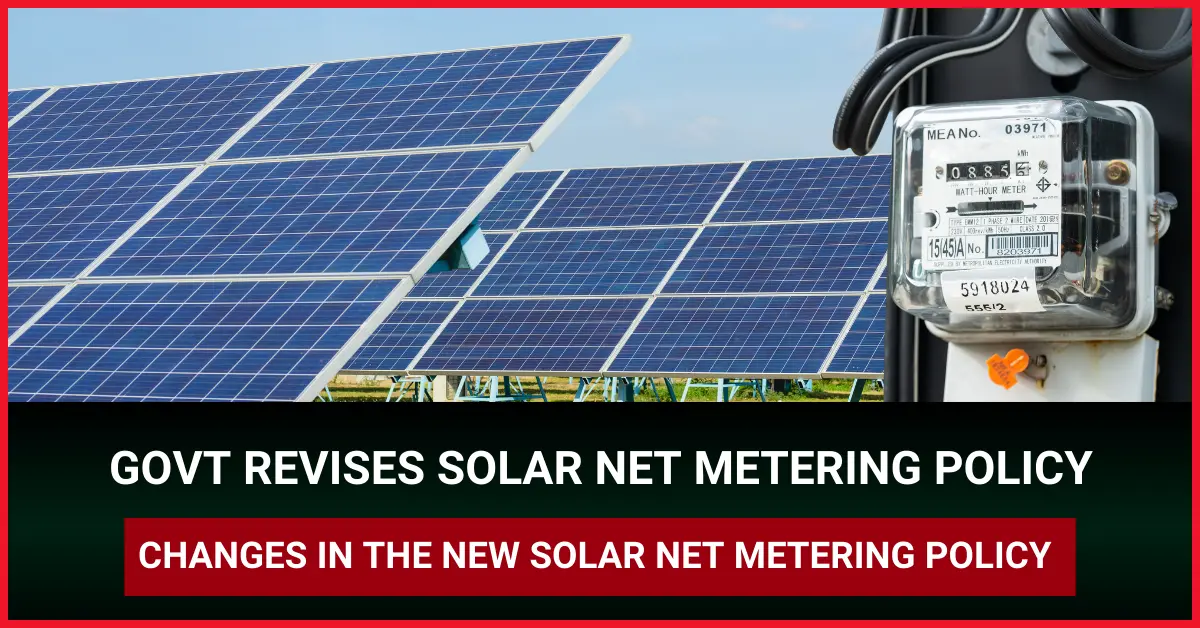The government has changed the Revises Solar Net Metering Policy, lowering the price it pays for extra electricity from rooftop solar panels. This change is to make electricity prices fair for everyone and to reduce extra costs for people who do not use solar power.
Key Changes in the New Solar Net Metering Policy
Under the revised policy, the government will now buy excess solar electricity at Rs10 per unit, a 63% reduction from the previous Rs27 per unit. Meanwhile, grid electricity prices remain high, with off-peak rates at Rs42 per unit and peak-hour rates at Rs48 per unit (excluding taxes).
Existing solar consumers with net-metering contracts will continue under the old terms until their seven-year contracts expire, after which they will be moved to the new framework. Additionally, solar users can now only install capacity up to 10% above their sanctioned load, a reduction from the previous 50% margin.
Why the Government Revised the Policy
The policy adjustments were made due to three major concerns:
- Overuse of the Grid as Free Storage – Many solar panel owners generate more electricity than they need, sending surplus energy to the grid in daylight hours and retrieving it at night. This practice effectively allows solar users to use the national grid as a free battery, without paying for capacity charges or transmission costs.
- Financial Burden on Non-Solar Consumers – According to the Ministry of Energy, net metering users have shifted a financial burden of Rs159 billion to non-solar users. If left unchanged, this could lead to an increase of Rs3.6 per unit in electricity prices by 2034.
- Infrastructure Risks – A rapid increase in net-metered solar users, particularly in urban areas, has raised concerns about grid stability and the risk of power infrastructure failure.
Government’s Perspective on the Changes
Federal Minister for Power Awais Ahmed Khan Leghari defended the policy shift, stating that the previous Rs27 per unit buyback rate provided an unfair windfall profit to solar users. He emphasized that reducing the buyback rate to Rs10 per unit is necessary to balance the power sector’s financial sustainability.
He also assured that there will be no tax on electricity exported to the grid by solar users, but they will continue paying 18% sales tax on electricity consumed from the grid.
Financial Impact of the New Policy
The government expects to save Rs545 billion by 2034 due to the revised net-metering rates. This is part of broader measures, including renegotiated Independent Power Producer (IPP) contracts, which have already saved Rs1,400 billion, translating to Rs400 billion per year.
Drop in Solar Panel Prices
Following the policy update, solar panel prices in Pakistan have dropped, with a Rs2 per watt reduction. This has made solar energy more accessible to consumers. Below is the latest pricing for solar systems:
| Solar System Size | New Price (PKR) |
| 5kW | 550,000 |
| 7kW | 625,000 |
| 10kW | 850,000 |
| 12kW | 978,000 |
| 15kW | 1,150,000 |
Hybrid systems (which include battery storage) will have additional costs. Off-grid solar users, such as those using solar tube wells or standalone battery-based systems, remain unaffected by the new policy.
Public Reaction and Concerns

The policy change has sparked mixed reactions. Critics argue that the sharp reduction in buyback rates discourages solar adoption and benefits the power sector monopolies at the expense of consumers. There is also concern that the government is trying to force consumers to stay dependent on expensive grid electricity.
However, experts suggest that despite these changes, solar power remains cheaper than grid electricity. With falling solar equipment prices, the payback period for installing rooftop solar is estimated to be around 3.5 to 4 years, based on a 15% plant factor and 25% solar-to-grid power usage ratio.
FAQs on the Revised Solar Net Metering Policy
How much will the government pay for surplus solar energy now?
The new buyback rate is Rs10 per unit, down from Rs27 per unit.
Will existing net metering consumers be affected?
No, they will remain on the old rates until their seven-year contracts expire.
Can I install a larger solar system than my sanctioned load?
No, the new policy only allows up to 10% excess capacity, down from 50% previously.
Are off-grid solar users affected by this policy?
No, those using solar panels with battery storage for homes, businesses, or tube wells are not impacted.
How will this policy affect the cost of solar energy?
Solar panel prices have dropped by Rs2 per watt, making installations Rs35,000 to Rs175,000 cheaper.



Join The Discussion